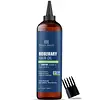What's inside
What's inside
 Key Ingredients
Key Ingredients

 Benefits
Benefits

 Concerns
Concerns

No concerns
 Ingredients Side-by-side
Ingredients Side-by-side

Caprylic/Capric Triglyceride
MaskingRicinus Communis Seed Oil
MaskingVitis Vinifera Seed Oil
EmollientPolyglyceryl-3 Polyricinoleate
EmulsifyingRosmarinus Officinalis Leaf Oil
MaskingCocos Nucifera Oil
MaskingOlea Europaea Fruit Oil
MaskingPersea Gratissima Oil
Skin ConditioningCeramide Ng
Skin ConditioningBiotin
AntiseborrhoeicAdansonia Digitata Seed Oil
EmollientHelianthus Annuus Seed Oil
EmollientBisabolol
MaskingTocopherol
AntioxidantMelaleuca Alternifolia Leaf Oil
AntioxidantGlycerin
HumectantLauric Acid
CleansingGlyceryl Laurate
EmollientEthylhexylglycerin
Skin ConditioningCharcoal Powder
AbrasiveCaprylic/Capric Triglyceride, Ricinus Communis Seed Oil, Vitis Vinifera Seed Oil, Polyglyceryl-3 Polyricinoleate, Rosmarinus Officinalis Leaf Oil, Cocos Nucifera Oil, Olea Europaea Fruit Oil, Persea Gratissima Oil, Ceramide Ng, Biotin, Adansonia Digitata Seed Oil, Helianthus Annuus Seed Oil, Bisabolol, Tocopherol, Melaleuca Alternifolia Leaf Oil, Glycerin, Lauric Acid, Glyceryl Laurate, Ethylhexylglycerin, Charcoal Powder
 Reviews
Reviews

Ingredients Explained
These ingredients are found in both products.
Ingredients higher up in an ingredient list are typically present in a larger amount.
Biotin is a B vitamin that is naturally produced by our bodies. It is also called Vitamin H.
Our bodies use biotin in the metabolism process. It also helps our bodies use enzymes and move nutrients around. A biotin deficiency can lead to brittle hair and nails.
More research is needed on applying biotin topically. However, taking biotin orally has been shown to help nourish the skin, hair, and nails. They play a role in forming skin-hydrating fatty acids.
Biotin is water-soluble. It can be found in foods such as fish, eggs, dairy, nuts, and meat. Vitamin H stands for "haar" and "haut". These are the German words for hair and skin.
Learn more about BiotinRicinus Communis Seed Oil is the INCI name for castor oil.
Castor Oil helps moisturize the skin. It is rich in a fatty acid called ricinoleic acid. This fatty acid helps prevent moisture loss on the skin. This helps keep your skin soft and hydrated. Ricinoleic acid also has anti-inflammatory and pain reducing properties.
Besides hydrating the skin, castor oil is also used to hydrate hair. By keeping the hair shaft moisturized, breakage is decreased. More studies are needed to show castor oil's effective on stimulating hair growth.
Castor oil is created by cold-pressing castor seeds and then purifying the oil with heat. It was used in Ancient Egypt as fuel in lamps and to help treat eye irritation.
The term 'fragrance' is not regulated in many countries. In many cases, it is up to the brand to define this term. For instance, many brands choose to label themselves as "fragrance-free" because they are not using synthetic fragrances. However, their products may still contain ingredients such as essential oils that are considered a fragrance.
Learn more about Ricinus Communis Seed OilRosmarinus Officinalis Leaf Oil is oil expressed from the leaves of the rosemary plant.
Rosemary Leaf Oil is a fragrance and helps give your product a scent. If you are sensitive to irritating fragrances, this one contains camphor. Camphor has been found to irritate skin.
This oil also contains antioxidant and antimicrobial properties. As an antioxidant, it may protect you skin against damage. This can help slow down the signs of aging.
Learn more about Rosmarinus Officinalis Leaf OilTocopherol (also known as Vitamin E) is a common antioxidant used to help protect the skin from free-radicals and strengthen the skin barrier. It's also fat soluble - this means our skin is great at absorbing it.
Vitamin E also helps keep your natural skin lipids healthy. Your lipid skin barrier naturally consists of lipids, ceramides, and fatty acids. Vitamin E offers extra protection for your skin’s lipid barrier, keeping your skin healthy and nourished.
Another benefit is a bit of UV protection. Vitamin E helps reduce the damage caused by UVB rays. (It should not replace your sunscreen). Combining it with Vitamin C can decrease sunburned cells and hyperpigmentation after UV exposure.
You might have noticed Vitamin E + C often paired together. This is because it is great at stabilizing Vitamin C. Using the two together helps increase the effectiveness of both ingredients.
There are often claims that Vitamin E can reduce/prevent scarring, but these claims haven't been confirmed by scientific research.
Learn more about TocopherolVitis Vinifera Seed Oil comes from the grape vine. Grape seeds are a byproduct of creating grape juice or wine.
The components of grape seeds have many skin benefits. Research has found it to be antimicrobial and anti-inflammatory. It also contains many potent antioxidants such as Vitamin E , Vitamin C, proanthocyanidins, polyphenols, flavonoids, and anthocyanins. Proanthocyanidin has been shown to help even out skin tone.
Antioxidants help fight free-radical molecules. Free-radical molecules are capable of damaging our cells and other genetic material. Antioxidants help stabilize free-radicals by donating extra electrons. Grape seed extract may help reduce the signs of aging.
The antimicrobial properties of grape seed may help treat acne. However, more research is needed to support this claim.
Grape seed has also been found to help absorb UV rays. Grape seed extract should not replace your sunscreen.
The fatty acids of grape seed oil give it emollient properties. Emollients help soothe and soften your skin by creating a film. This film traps moisture within, keeping your skin hydrated.
Learn more about Vitis Vinifera Seed Oil